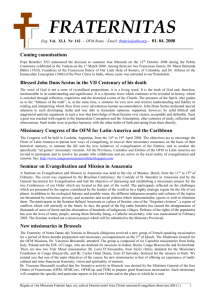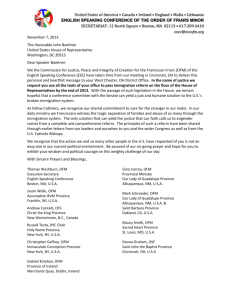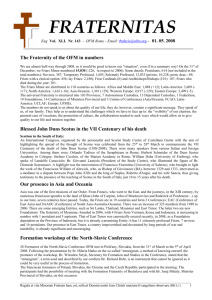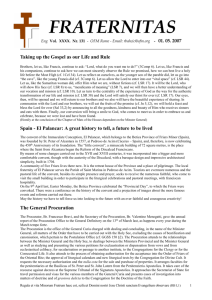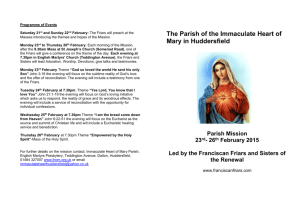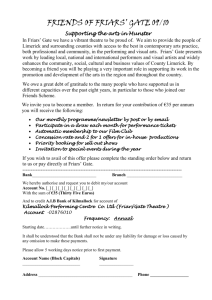A Continental Congress of Formation
advertisement
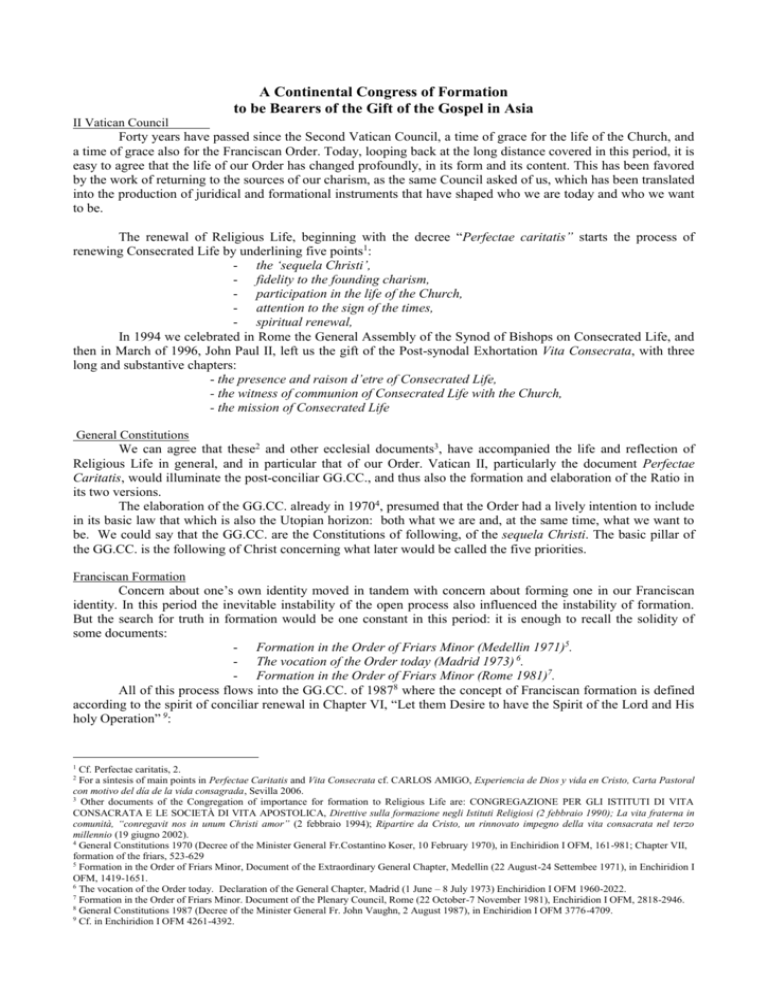
A Continental Congress of Formation to be Bearers of the Gift of the Gospel in Asia II Vatican Council Forty years have passed since the Second Vatican Council, a time of grace for the life of the Church, and a time of grace also for the Franciscan Order. Today, looping back at the long distance covered in this period, it is easy to agree that the life of our Order has changed profoundly, in its form and its content. This has been favored by the work of returning to the sources of our charism, as the same Council asked of us, which has been translated into the production of juridical and formational instruments that have shaped who we are today and who we want to be. The renewal of Religious Life, beginning with the decree “Perfectae caritatis” starts the process of renewing Consecrated Life by underlining five points1: - the ‘sequela Christi’, - fidelity to the founding charism, - participation in the life of the Church, - attention to the sign of the times, - spiritual renewal, In 1994 we celebrated in Rome the General Assembly of the Synod of Bishops on Consecrated Life, and then in March of 1996, John Paul II, left us the gift of the Post-synodal Exhortation Vita Consecrata, with three long and substantive chapters: - the presence and raison d’etre of Consecrated Life, - the witness of communion of Consecrated Life with the Church, - the mission of Consecrated Life General Constitutions We can agree that these2 and other ecclesial documents3, have accompanied the life and reflection of Religious Life in general, and in particular that of our Order. Vatican II, particularly the document Perfectae Caritatis, would illuminate the post-conciliar GG.CC., and thus also the formation and elaboration of the Ratio in its two versions. The elaboration of the GG.CC. already in 19704, presumed that the Order had a lively intention to include in its basic law that which is also the Utopian horizon: both what we are and, at the same time, what we want to be. We could say that the GG.CC. are the Constitutions of following, of the sequela Christi. The basic pillar of the GG.CC. is the following of Christ concerning what later would be called the five priorities. Franciscan Formation Concern about one’s own identity moved in tandem with concern about forming one in our Franciscan identity. In this period the inevitable instability of the open process also influenced the instability of formation. But the search for truth in formation would be one constant in this period: it is enough to recall the solidity of some documents: - Formation in the Order of Friars Minor (Medellin 1971)5. - The vocation of the Order today (Madrid 1973) 6. - Formation in the Order of Friars Minor (Rome 1981)7. All of this process flows into the GG.CC. of 19878 where the concept of Franciscan formation is defined according to the spirit of conciliar renewal in Chapter VI, “Let them Desire to have the Spirit of the Lord and His holy Operation” 9: 1 Cf. Perfectae caritatis, 2. For a síntesis of main points in Perfectae Caritatis and Vita Consecrata cf. CARLOS AMIGO, Experiencia de Dios y vida en Cristo, Carta Pastoral con motivo del día de la vida consagrada, Sevilla 2006. 3 Other documents of the Congregation of importance for formation to Religious Life are: CONGREGAZIONE PER GLI ISTITUTI DI VITA CONSACRATA E LE SOCIETÀ DI VITA APOSTOLICA, Direttive sulla formazione negli Istituti Religiosi (2 febbraio 1990); La vita fraterna in comunità, “conregavit nos in unum Christi amor” (2 febbraio 1994); Ripartire da Cristo, un rinnovato impegno della vita consacrata nel terzo millennio (19 giugno 2002). 4 General Constitutions 1970 (Decree of the Minister General Fr.Costantino Koser, 10 February 1970), in Enchiridion I OFM, 161-981; Chapter VII, formation of the friars, 523-629 5 Formation in the Order of Friars Minor, Document of the Extraordinary General Chapter, Medellin (22 August-24 Settembee 1971), in Enchiridion I OFM, 1419-1651. 6 The vocation of the Order today. Declaration of the General Chapter, Madrid (1 June – 8 July 1973) Enchiridion I OFM 1960-2022. 7 Formation in the Order of Friars Minor. Document of the Plenary Council, Rome (22 October-7 November 1981), Enchiridion I OFM, 2818-2946. 8 General Constitutions 1987 (Decree of the Minister General Fr. John Vaughn, 2 August 1987), in Enchiridion I OFM 3776-4709. 9 Cf. in Enchiridion I OFM 4261-4392. 2 “Franciscan formation pursues the objective of making possible, under the action of the Holy Spirit, for all the friars and candidates, the constant following of Christ, according to the form of life of Saint Francis and the Rule, in the concrete situation of their time”. 10 The dynamic structure of a text serving both for legislation and identity, is of fundamental importance. The GG.CC. are born, not as a strict map of what you can or cannot do, but as an instrument for life, since in it is formed what the Order itself wishes to live, which is nothing other than “to follow the footprints of our Lord Jesus Christ, living in obedience, without anything of our own, and in chastity.” These have been forty years of fraternal insistence on following and perhaps now, when we have the necessary distance to be more objective, following still emerges with the freshness it always has, because following does not point out to us the limits of identity, but the goal of the vocational journey, which is Christ, showing a “forma vitae,” a way of living: “this is the Life and Rule of the Friars Minors”. To live, and live evangelically and in fraternity, are indispensable keys for the Franciscan way of following. The Gospel and the fraternity are the keys of the new GG.CC. which do not refer back to the conventual forms of living, but to the original obedience to the Gospel; which do not have the formal limits of the convent as boundaries, but call us to a fraternal bond in the “propositum vitae” of the following of Christ, and Him crucified. Vatican II and the GG.CC. gave birth in our Order to a charismatic period based on following, a period that remains open, and we believe still can give abundant water to invigorate our life. The GG.CC. also had the central insight to define formation by beginning with ongoing formation, within which is found the raison d’etre of initial formation. Ratio Formationis Francescanae From the formative point of view, in this period the Order was thinking and rethinking a new kind of formation for a new religious life. Besides the documents cited above, we celebrated, twice for each stage of formation, International Congresses of the different stages; and the Order produced in 1991, a Ratio Formationis Franciscana, which was improved in the new edition of 2003. The Ratio Formationis Franciscanae11, more than a juridical document, seeks to offer to the whole Order the reason that animates and orients formation work at the level of the whole Order, offering inspiration, principles, planning outlines and pedagogical methods for the forming of a Lesser Brother today, in his concrete reality, in such a way that we assure the necessary unity and coherence of programs of ongoing and initial formation which each Entity is called to elaborate. The RFF, in confronting the different aspects of formation, seeks to present the basic elements through which the following of Christ can be lived as the fundamental task of Franciscan formation, holding to Jesus Christ, poor, humble and crucified and the only Master, according to the example of St. Francis. In 1995 there was published a document on Formation in the Order of Friars Minor12, in 2001 the Ratio Studiorum13; and in 2002, “Orientations for the pastoral care of vocations” 14. Finally we reached the point of promulgating the new Ratio Formationis Franciscanae15, which besides other changes, adds three chapters to the earlier one: - Franciscan pedagogy - Formation in the evangelical life of the lesser brother. - Vocational accompaniment. The last document would be one on ongoing formation: “You have been called to freedom” 16, in which the Minister General gives some reflections on the path followed by the Order in regard to formation, which seems to me appropriate to recall17, at this point of seeing… where are we? - we have become aware of the importance of ongoing formation as the ‘humus’ for initial formation 10 Art. 226, CC.GG, in Enchiridion I OFM 4261. Prot. 076548(389), Ratio Formationis Francescanae in Enchiridion II OFM, 120-370. 12 GENERAL SECRETARIAT FOR FORMATION AND STUDIES OFM, Ongoing Formation in the Order of Friars Minor, in Enchiridion II OFM, 2057-2253. 13 GENERAL SECRETARIAT FOR FORMATION AND STUDIES OFM, Ratio Studiorum OFM “In notitia veritatis proficere”, in Enchiridion II OFM, 3943-4114. 14 GENERAL SECRETARIAT FOR FORMATION AND STUDIES, Orientations for the pastoral care of vocations. “Come and See”, in Enchiridion II OFM, 4396-4662. 15 Decree of the Minister General OFM, Fr. Giacomo Bini, 19 March 2003 (Prot. 093060). Ratio Formationis Francesacanae, in Enchiridion III OFM, 55-349. 16 GENERAL SECRETARIAT FOR FORMATION AND STUDIES, “You have been called to freedom”, Formation in the Order of Friars Minor, Rome 2008. 17 J. RODRIGUEZ CARBALLO OFM, Minister General, Presentation, “You Have Been Called to Freedom”, Formation in the Order of Friars Minor, Rome 2008. 11 - we have clarified the essential bases of Continuing Formation adapted to our times we have learned that it is not possible to refound the Order without an ongoing and initial formation that is new: in its content, its methods and its passion. The Present Formative of the Order Attempting a preliminary synthesis, a concise and clear synthesis of the position of the Order in regard to formation in this period since Vatican II up to our day, we can select five points, as a positive response to the question Where are we in formation to Franciscan life? following and discipleship are both key to the GG.CC. and the heart of our Franciscan identity accompaniment and pedagogy are the central methods of the RFF, ongoing formation is the ‘humus’ of initial formation, the priorities have clarified the bases and principles of our Franciscan identity and formation, Franciscan formation, ongoing and initial, is called to adapt itself to our present reality. The General Chapter, Assisi 2009 and the I Continental Congress of Formation in Asia The General Chapter of 200918 opens up to a new phase in the dynamic of Formative Congresses entrusted to our Secretariat. The Chapter requested that Continental Congresses should be invoked in the whole Order and that, according to the General Definitory, these should converge into an International Congress for all the Provincial Secretariats of Formation and Studies of the Order. 36. The General Definitory, through the GSFS, should promote meetings at the Conference and Continental levels for: - Formators of the Simply Professed, given the importance of this stage of formation; and - Formators for the Pastoral Care of Vocations and for Postulancy, to help deepen their knowledge At the beginning of the new Definitory, this Secretariat presented an initial program, which was approved by the same Definitory. Moreover, according to the Executive Committee of the SGFS 19, the program is set to unfold as follow as a development of the Capitular Mandates: Congress of Asia, September 2010. Congress of Latin America (UCLAF) Congress of North America (ESC), August 2012. Congress of Western Europe Congress of Eastern Europe Congress of Africa The participants will be 2 per Entity20, one formator for the phase of simple profession and another for the area of pastoral care of vocations or Postulancy. The themes were chosen according to the mandates: 21 a) Assessment of the knowledge and application of RFF and RS in the formation phases of simple profession and pastoral care of vocations and Postulancy. b) Franciscan Formation in the evangelical counsels c) Franciscan Formation in Sacramental Life. d) Accompanying in initial formation Friars called to ministry. The Congress convoked by the Minister General 22 was based on a survey we sent out to Provincial Secretaries of the two Conferences of Asia. It was then forwarded to the Entities, studied carefully by the Secretariats in Rome and will once again be re-studied in the same Congress in a general dynamic of re-reading, assimilation, and putting into practice of our formative efforts in Asia. Hopes of the Congress Cfr. Portatori del dono del Vangelo. Documento finale del Capitolo Generale dell’Ordine dei Frati Minori, Assisi Pentecoste 2009. Roma, 25-26 enero 2010. 20 Mandato 36, Capítulo General OFM 2009. 21 Mandato 35, Capítulo General OFM 2009. 22 Lettera del Ministro General, 20 mayo 2010; Prot. 100970 (098/10) 18 19 Therefore, we initiate this series of Continental Congresses in Asia thru this Continental Congress of Formation. It is a new formula and tool of ongoing formation aimed at grasping the concrete reality of the geographical areas of the Conferences. Drawing closer to reality is of necessity. Truly, we are called to do a more fraternal reflection on reality in order to respond better and more evangelically to the key question, How are we to form ourselves in order to live the Gospel permanently? The answer is only one, just as the charism of discipleship of Christ given to St. Francis is also one. Yet, this unity must be answered by each culture each with his own genius. The Christian principle of the Incarnation leads us to inculturate the Gospel in each town. In the same way, the Franciscan “forma vitae” must be rooted in each culture. To form is to mold the heart of the one permanently being called after the model himself, Jesus Christ. Far from the temptation of uniformity or dispersion, “We have been called to Freedom” 23. With this liberty, we must project a formation for the present and the future, which of necessity springs from the most rich and healthy tradition of the Order, but, nonetheless making its way toward new models. The challenges are many, such as sociocultural changes, migratory movements, new communications, social injustices, wars, new economic dependency, political structures, natural catastrophes, interreglious are man, new evangelization (ad extra) or to renovate (ad inra) the journey of Order… Many are the challenges and no one has said that they are easy, yet we are a missonary Order and, as the General Chapter affirms “Bearers of the Gift of the Gospel”. To form for it and in it is the challenge being asked of us today – that is if want to be faithful to the Gospel we have professed; we must “walk from the perspective of the Gospel.24 To be Bearers of the Gospel in Asia, in its mosaic of cultures and languages, in its ethnic diversity and traditions, in its rich cultural and religious patrimony, will lead us always to meet the man and woman that seeks – though unaware many times – the face of God in the depth of his/her heart. In this way, we will see ourselves as “mendicants of meaning”25 and companions of a generation which also seeks the meaning of life. We have encountered Christ, the Alfa and Omega, the Lord of Life, a mystery which unveils itself through the Word and Eucharist, in every person and event, in the Church and creation…The Gospel is the best that we have. For this reason, it is a gift and not a heavy burden or something dispensable. Rather, it is a gift that we would want to live. Our Order wants to restore the gift of the Gospel to the peoples of Asia in a Evangelization and Misión that each time relies more on the collaboration between the Entities of the Order. Thus, it will be giving a more plural face to our Fraternities. Formation does not form so that the Order may grow, but, rather, so that the Gospel may be proclaimed to every creature. For this reason, we ourselves are the first ones who should be in continual evangelization as Friars Minors. Ongoing formation is a continual walking from the perspective of the Gospel; it is a starting anew through Christ who became our way. We are lesser brothers, “pilgrims and strangers” who want to live the Gospel in fraternity in Asia, which so many consider an emerging zone of the world. We want to look at Asia with the same eyes of Asia, from within, though the eyes of men and women of Asia, in order to share with them the bread of the Eucharist and the word of the Gospel. The Order has fundamental challenges in Asia 26: a) The first effort should be inculturation. The Synodal Fathers in the special Assembly for Asia wanted to animate a new process of inculturation both wide and deep while singling out some areas of particular attention, such as theological reflection, liturgy, formation of priests and religious, catechesis, and spirituality. For us, Franciscans, a first way of inculturation is the “implatatio Ordinis” in Asia. To form true autochthonous Friars Minors means to incarnate our charism in Asian culture and religiosity as well as be able to offer the Church a lived out model of inculturation. b) The second challenge for us, who are sons of the Saint of reconciliation and peace, is to contribute in an important way to the internal communion of the Catholic Church, ecumenical dialogue, and interreligious dialogue. United to this is also the work for justice and peace within each town and between the towns of Asia. c) A third constant effort which actually continues a long missionary tradition are social works and human promotion as silent witnesses, living and eloquent witnesses of religious life in Asia. SEGRETARIATO GENERALE PER LA FORMZAIONE E GLI STUDI, “Siate stati chiamati a libertà”, La formazione nell’Ordine dei Frati Minori, Roma 2008. 24 Caminar desde el Evangelio. Orientaciones generales de animación para el sexenio 2010-2015, Roma 2010. 25 Cf. Il Signore ti dia pace, Documento del Capitolo generale 2003, 6. 26 Cfr. “I Frati Minori in Cina”, Discorso del Ministro Generale OFM, Fr. José Rodríguez Carballo ofm, in occasione della Giornata di Studio della Pontificia Università Antonianum, Roma 15 gennaio 2010. 23 To enter in the culture in order to evangelize is to incarnate our vocation. To enter into the life of our generation with its values and exchange values, with its contradictions and attainments, is a difficult challenge we can’t avoid. Our fraternal life doesn’t develop in the cloister; rather, it is placed and exposed in the middle of the square with all its risks and truth. We cannot live a greenhouse life, protected and hidden away. We are called to go out into the open to share the present with both the world and the Church, giving value to what really matters, namely, the Gospel of life, Jesus Christ. We are celebrating Continental Congress of Formation in Asia. In this way, Asia becomes an all-embracing square in our cloister and becomes a space where the Order wants to grow dynamically in on-going formation. As was already pointed out in the questionnaire27, meeting fraternally, dialoguing with charity, listening to each other, sharing experiences, dynamics, vocational and informative materials to help us through difficult moments, are all first fruits of this Congress of Formation. Celebrating, therefore, this International and Multicultural Congress as a Fraternity of Formators, paves the way to a future of hope where there is a chorus dynamism and greater collaboration between the Entities at both the formative and evangelizing levels. Moreover, by restoring the grace of the origins of our Charism, we are led to newer concrete realities of the people of Asia. In order to progress from good to better, also in the formation in Asia, of both the present and the future of the 21st century is called to be: - more evangelical and less formal - more permanent and less initial - more accompanied and less self-sufficient - more fraternal and less individualistic - more inculturated and less protected - more prayerful and less scattered - simpler and less complicated - more missionary and less on the conservation side - more evangelizing and less resistant - more ecclesial and less religious - more Christian and less Franciscan - more pedagogical and less improvised - more human and less perfect - more merciful and less proud - more eschatological and less immediate - more unitary and less anarchical - more just and less arbitrary - more pacific and less pushy - more personalized and less superficial - more believing and less practicing - more hopeful and less anxious - more charitable and less sterile Yes, we can affirm without fear that the renewal of Consecrated Life today depends on a new and unitary on-going formation, from it phases of initial formation until the end of each Friar Minor’s life. Without this fundamental basis, all formative itinerary will not be as effective.28 It is precisely along these lines that we are called to walk in the upcoming years. Br. Vidal Rodríguez López ofm Secretary General for Formation and Studies 27 Cfr. Pregunta n.24 del Cuestionario del SGFS para el Congreso. Tomamos esta afirmación de J. RODRIGUEZ CARBALLO OFM, Ministro generale, Presentazione, “Siate stati chiamati a libertà”, La formazione nell’Ordine dei Frati Minori, Roma 2008. 28
